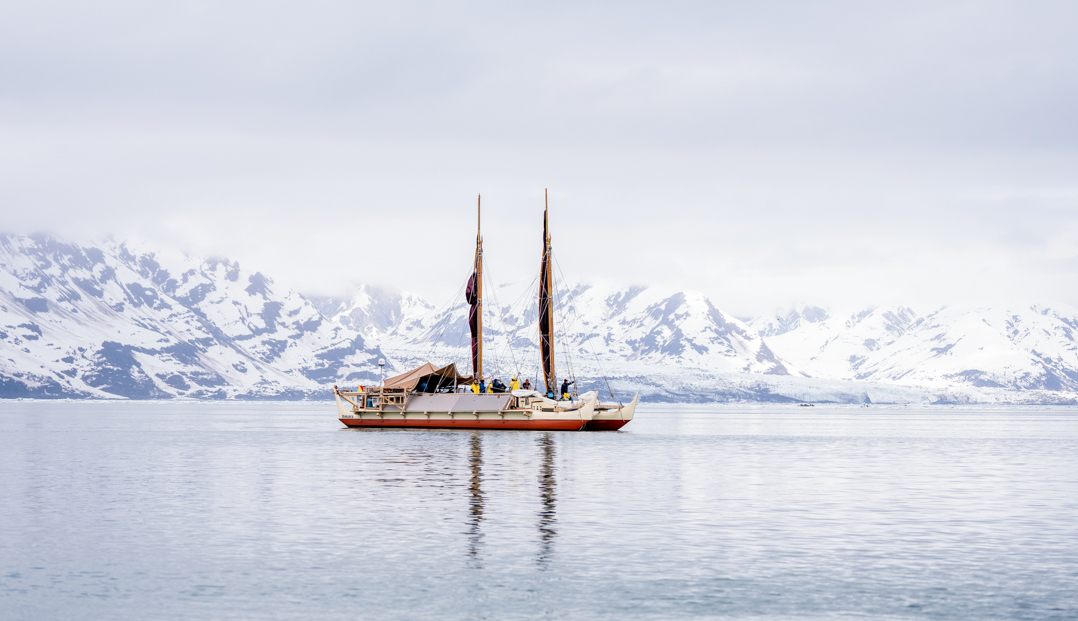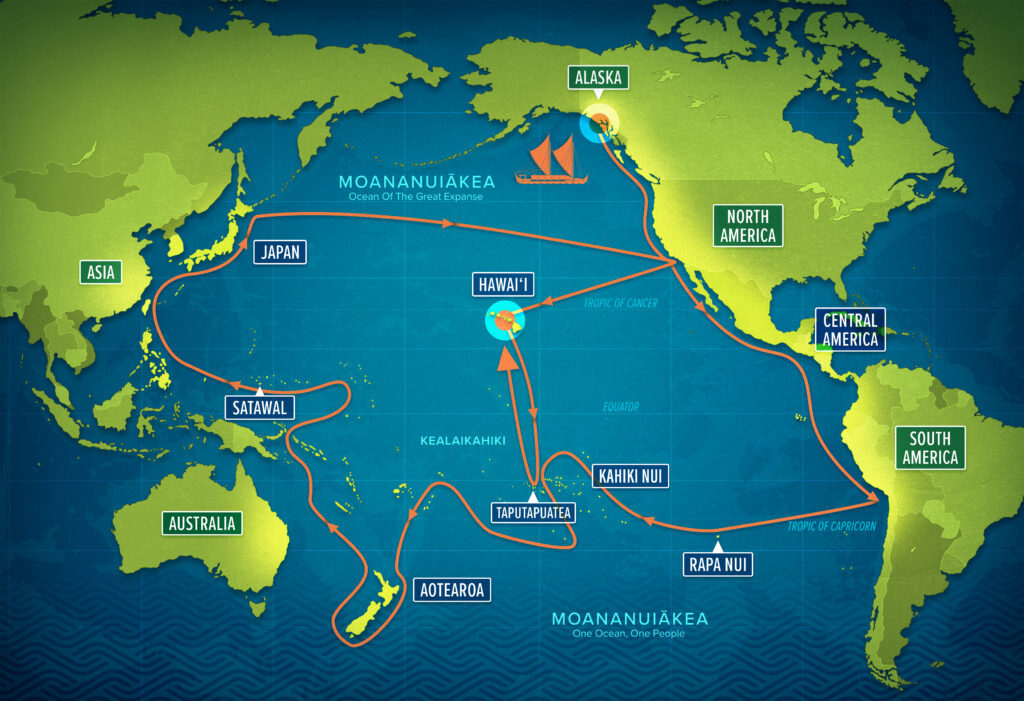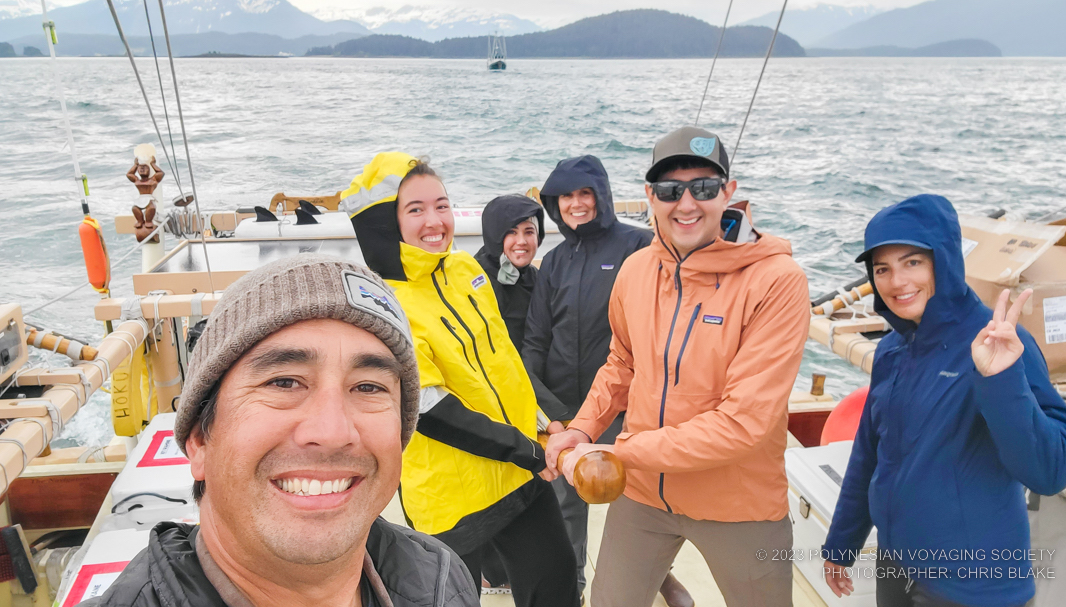
- Details
- By Jenna Kunze
A dozen Native Hawaiʻian navigators will set sail from Juneau, Alaska this coming week to begin a four-year voyage around the Pacific Ocean by canoe.
The expedition will stop in 36 countries and archipelagoes, visiting 100 Indigenous territories with the goal to educate and learn from communities on Indigenous knowledge and planetary health.
The Moananuiākea Voyage, meaning “the wide expansive oceans” in Native Hawaiʻian, was named for the heart of the trip’s mission.
“In some beliefs, people believed that the oceans separated us. But we're of the belief that the oceans have always connected us,” said Chris Blake, a Native Hawaiʻian crew member and captain-in-training who teaches high school science and celestial navigation in Oahu. “Its health both above water and below is important to ensure that this amazing space is going to be taken care of for generations to come.”
A rotating crew of 400 volunteers—members of the Polynesian Voyaging Society— will participate in the four-year journey for stints of about a month at a time, Blake told Native News Online. They will sail on two canoes: Hōkūleʻa, a 60-foot double hulled Polynesian deep-sea voyaging canoe; and Hikianalia, a 72-foot, engine powered, deep escort sea vessel. Each canoe will be staffed with roughly a dozen crew members the entire journey, Blake said.
The voyage will make stops in: British Columbia, Seattle, the West Coast, Mexico, Central America, South America, Polynesia, New Zealand, Melanesia, Micronesia, Palau, Japan, and Tahiti. At each port along the 43,000 nautical mile route, the crew will visit with Indigenous communities, and connect with both educators and students.
“The hope is to inspire and discuss and share, and to help to nurture this network of educators so that after the vessels are gone, the longer lasting connection we have is through education,” Blake said.
 The 47-month expedition will stop in 36 countries and archipelagoes, visiting 100 Indigenous territories with the goal to educate and learn from communities on Indigenous knowledge and planetary health. (Map: Polynesian Voyaging Society)
The 47-month expedition will stop in 36 countries and archipelagoes, visiting 100 Indigenous territories with the goal to educate and learn from communities on Indigenous knowledge and planetary health. (Map: Polynesian Voyaging Society)
Stories collected throughout the voyage—including videos, blogs, educational resources, and virtual reality—will be continuously uploaded to an online learning platform.
Two weeks ago, the Hōkūleʻa set sail on a pre-voyage trip around Southeast Alaska. The trip was intended to honor contributions from the Alaska Native communities that helped perpetuate traditional Native Hawaiʻian voyaging practices.
In 1990, the Polynesian Voyaging Society, in an attempt to revive traditional canoeing practices, devised a plan to build a canoe using solely traditional materials, such as the koa tree. But deforestation kept them from finding a suitable tree, so voyaging society leaders asked for help from southeast Alaska Native communities who also traditionally relied on canoeing.
The late Tlingit elders Judson Brown— former chairman of the Sealaska Foundation—and Byron Mallott, former CEO of the Sealaska Corporation, gifted their Native Hawai’ian relatives two 200-foot Sitka spruce logs to help construct the voyaging canoe, Hawai‘iloa.
At pre-voyage stops in Yakutat, Hoonah and Haines, Blake said he saw similarities between Alaska Native communities and his own.
“The last generation of elders in Alaska doesn't have the ability to speak their language, because their parents didn't want to have them undergo persecution,” Blake said. “That mirrors what happens in Hawai‘i.”
But so, too, does the resurgence of Indigenous languages, culture, and traditions in both communities, Blake said. “Now, the ground is much more fertile to begin to ask questions that are rooted in our Native Hawai‘ian culture, to begin to be asked by our Native learners about their culture, and how we can begin to push things into making sure that our voices are continued to be heard.”
 “(Some) people believed that the oceans separated us. But we're of the belief that the oceans have always connected us,” said Chris Blake (pictured, far left), a Native Hawaiʻian crew member and captain-in-training. (Photo: Chris Blake)
“(Some) people believed that the oceans separated us. But we're of the belief that the oceans have always connected us,” said Chris Blake (pictured, far left), a Native Hawaiʻian crew member and captain-in-training. (Photo: Chris Blake)
Hōkūleʻa is scheduled to arrive in Juneau on June 10, where it will be welcomed on the traditional lands of the A’akw Kwáan. The canoe and crew will stay in Juneau for a week of community and educational engagements, and push off for its circumnavigation voyage on Thursday, June 15.
“You can't know where you're going unless you know where you've been,” Blake said of the significance of the journey. “The way that we look to our past in order to shape our future, and these communities that are doing it in their excellence, are some of the reasons why I see it as a privilege to be able to sail for our island home.
"These communities that are welcoming us with open arms deserve to have their stories told and shared, and Hōkūleʻa allows for that platform to show the world what can be done when we choose peace, and we choose the health of our Earth.”
More Stories Like This
Trump signs law that revokes some limits on drilling in Alaska’s National Petroleum ReserveSouthern Sierra Miwuk Nation Gets 900-Acres ofLand Back
Chilkat Indian Village Tells New Palmer Mine Owners They Are “Not Welcome” in Chilkat Valley
Tribes, Coastal Group Ask Army Corps to Revoke Permit for Texas Export Terminal
Michigan Tribes Tell Supreme Court: Don’t Bail Out Enbridge
Help us defend tribal sovereignty.
At Native News Online, our mission is rooted in telling the stories that strengthen sovereignty and uplift Indigenous voices — not just at year’s end, but every single day.
Because of your generosity last year, we were able to keep our reporters on the ground in tribal communities, at national gatherings and in the halls of Congress — covering the issues that matter most to Indian Country: sovereignty, culture, education, health and economic opportunity.
That support sustained us through a tough year in 2025. Now, as we look to the year ahead, we need your help right now to ensure warrior journalism remains strong — reporting that defends tribal sovereignty, amplifies Native truth, and holds power accountable.
 The stakes couldn't be higher. Your support keeps Native voices heard, Native stories told and Native sovereignty defended.
The stakes couldn't be higher. Your support keeps Native voices heard, Native stories told and Native sovereignty defended.
Stand with Warrior Journalism today.
Levi Rickert (Potawatomi), Editor & Publisher

